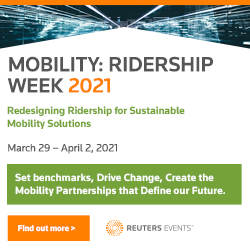
The transportation industry is in flux. Disrupted by COVID-19, technology, and the energy transition, it is going to change more in the next 5 years than ever before.’
Pandemic has created gaps in service delivery and huge loss of revenue forcing cities and transit authorities to transition to restructure and redesign infrastructure, funding, and service strategy. It has also created huge opportunities for public-private partnerships and for mobility platforms to integrate more so than ever before.’
Traditional transit is now faced with protecting existing revenue streams and enabling equitable access of people and goods whilst preparing for seismic change. Failure to evolve will prove fatal, and timing is everything.’
Ridership Week connects the leading national, state and city officials with the C-Suite in transit and mobility from largest technology, infrastructure, OEM and mobility companies on the planet.’
Join us to identify the business models, revenue strategies, infrastructural requirements and public/private partnerships that reduce emissions, finance and enable the safe and equitable movement of people, goods and services.’
Ridership Week will be taking place online March 29 -‘
April 2nd.’
Key themes:’
- The Future of Ridership: Examining ridership curves, predictions and mid to long-term policy planning
- Interoperable Mobility: Strategic partnerships to create sustainable and equitable mobility solutions.
- Sustainable Financing: Public/private funding strategies for fiscally resilient mobility
- Restructuring Public Transit: Physical and digital infrastructural strategies to adjust to evolving ridership behaviours.
Luke James, Head of Mobility at Reuters Events, said ‘Ridership is the lifeblood of mobility, which lies at the epicentre of economies, governance, and the smart cities of the future. Mobility transformation is critical to every city and nation as they grapple with effects of massive health, social and technological challenges.’
Ridership Week is the opportunity for the leading and forward-thinking transport authorities, regions and nations to set their agenda and partnership strategies for a resilient, equitable and sustainable mobility future.



